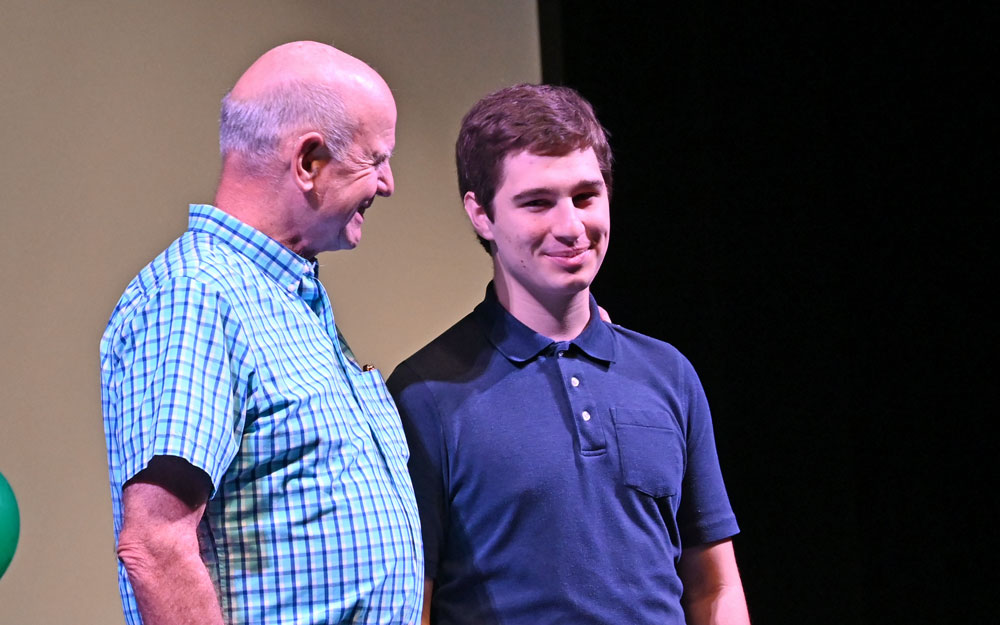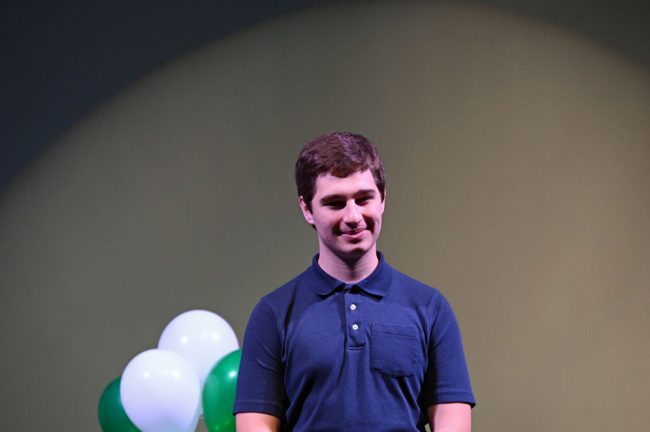
In mid-September Dylan Long, a senior at Flagler Palm Coast High School and a Tesla and electric car enthusiast noticed that Palm Coast City Council member Nick Klufas, another Tesla disciple, had acquired the new Model S Plaid. Long contacted Klufas through Twitter. He wanted to see the car, ride it, talk about it. “Never hurts to ask, right?” Long wrote Klufas.
“Also, as a fellow-EV enthusiast,” Long added, “I figured I’d let you know that there’s a huge EV meet-up in Orlando next weekend. I’m taking my 2013 Nissan Leaf and am very excited for it. If you’re interested and are free, I’m sure everyone would love to see your Plaid!”
They met. “I immediately I knew he was fully qualified in what he was talking about,” Klufas said this evening. “He’s so knowledgeable with electrification of vehicles, Tesla specifically, but it blew my mind how he knew the entire market segment and the entire technology.” Long’s mother Amy, his sister and others came along, “all top-tier individuals,” Klufas said. “We went for a drive and he was impressed. I showed him the autonomy features, and he knew a multitude of things beyond electric cars too. He’s a big SpaceX fan, which I’m also a big SpaceX fan, he understood rocketry at a much higher level than I do.” The councilman said he was blown away with Long’s knowledge retention–and his ability to converse and explain what he knows in accessible language to friends who may not have the same capabilities. “I was really impressed with him.”
So have many others been.
Long, 18, who’s in the International Baccalaureate program, is the Flagler County school district’s first-ever winner of the $40,000 Leader for Life grant award. The district had previously had one finalist. Long received the award at a brief ceremony at the Flagler Auditorium Tuesday morning, with Superintendent Cathy Mittelstadt, FPC Principal Greg Schwartz and Education Foundation Director Joe Rizzo, along with members of Long’s family, all present.
“This is all him, this is all him, and it’s been amazing,” Greg Schwartz, FPC’s principal said.
Long, a future computer scientist with a heightened interest in environmentalism and technology (he started an environmental program at FPC), spoke with modesty of his award. He’d won a Macbook Pro for being a finalist: “I was just in class and they came into class and they brought balloons and the the empty box of the computer,” he said, “and a few other things just to celebrate. That’s really cool. And then today I was just an English class and they tell us we had to go to the auditorium.” Not a bad way to get out of dealing with Conrad’s Heart of Darkness, which apparently hasn’t been the greatest hit in class, though Long says he’s one of the few enjoying it. “I knew that today was the day but that was the only thing I knew.”
Long is focusing on computer science in college. He intends to apply to MIT, Carnegie Mellon and Georgia Tech universities. His first choice is “complicated,” he said. It can be either the University of Florida or Georgia Tech, “but if I get into MIT or Carnegie Mellon, I expect I’ll probably go there.” As part of the award he will get a semester abroad and leadership training every year, plus summer internships. There’s been 63 Leader for Life scholars. Long is the 64th.
The award is from the the Delray Beach-based Asofsky Foundation, a little-known 12-year-old Delray Beach-based non-profit led by Mark Asofsky, who’s owned various companies and non-profits. The award is administered through the state’s and the county’s Take Stock in Children program by way of the Flagler Education Foundation.
The award is worth $10,000 a year over four years, over and above whatever he may get from the university he attends. That’s in addition to the $8,000 scholarship he’s getting from Take Stock in Children locally. The Education Foundation raises half that money, the Legislature matches the money, dollar for dollar. Potentially, he gets an additional $32,000 from take Stock, for a total of $72,000 over four years.
It’s a large amount. But keep in mind that attending most private universities now costs over $70,000 a year. MIT’s cost is $77,000. Georgia Tech would cost $50,100. In comparison, attending the University of Florida would cost $21,400, attending the University of Central Florida, which Long has also mentioned, would cost $18,000.
“Obviously,” Long said of the award, “it takes off a huge financial burden for college, which was kind of unsure given our family’s financial situation and such.” He is almost certain to get many more awards from the university of his choice.
He’s equally laid back and serious, unassuming and focused. He didn’t hesitate with his answer when asked to describe the sort of work method that may have contributed to his success, delivering on the spot what amounts to the abstract of an essay: “Yeah, I expect to use it more going forward, but kind of first principles thinking, where you kind of start from the most basic things and you kind of remove all previous assumptions about something. So if someone presents a problem to you, you don’t kind of go with whatever one had previously done. You think of–okay, what is the best way that we could do, assuming no previous assumptions, if that makes any sense? I feel like that’s been really helpful. And then just along with understanding the actual physical limit of what’s possible and not what’s just imposed or what was previously done, to be innovative and and try new things and such.”
In his essay for the scholarship he said “I would be interested in working on self-driving cars, but I feel like by the time I’m able to be educated to impact that, that will be a solved problem by then.” So he’s looking at different fields. “I’m most interested right now in brain machine interfaces,” which he describes as connecting computers to brains to read and understand the brain better. The field, he says, “will open up a lot of opportunities in healthcare and even beyond healthcare, but just lots of lots of opportunities. And I think that field has a long way to go. So I expect to be able to make good contributions to it. We’ll see what college brings.” He was among the winners a few months ago of the University of Florida’s multi-county MedNexus Innovation Challenge.
Long and Klufas have stayed in contact because of the club Long created at school with Kevin Saint, a teacher (Long got him to buy a $5,000 Nissan Leaf, too), called Sustainable Flagler, meeting three times a week (and through Klufas’s Plaid YouTube channel). Saturday, Long will be holding an electric-car showcase at Palm Coast City Hall. Klufas, of course, will be there with his Plaid. Eight or nine local electric-car owners will be showing up with theirs. “We expect to do much bigger events in the future. We just felt like in order to do a big event, we should do a small event to get a sense of what putting on an event is like,” he said.
“I kind of knew when he was in 10th grade that he was going to be one of the students that I nominate because he’s brilliant,” says Christy Butler, the student services coordinator for Take Stock in Children program.
Take Stock is at heart a mentorship program (Long’s mentor is Peter Sutcliffe) that seeks out promising, committed scholars from families with challenges–children of single parents, households of limited means and the like.
He was born in Oregon. His mother Amy and his father were from Upstate New York, where Long spent some years. Amy Long’s ex-husband had a job at Florida Coastal School of Law in Jacksonville, bringing the family to Florida in 2008, and to Palm Coast in 2014. Dylan, the product of montessori school, went to Bunnell Elementary, Indian Trails Middle School and now FPC. Long has logged 631 hours of community service hours so far, with several months to go. On January 12 and 13, Long will meet other Leader for Life fellows in Tallahassee, including an event at the Governor’s Club. Sidney Williams, a 16-year-old Interlachen Junior-Senior High School senior, and Myles Summerlin, a Booker High School in Sarasota County, are among the other winners.
“I just think it’s a great opportunity,” Rizzo, the Education Foundation’s executive director, said. Referring to Take Stock, which accrues students who qualify for full college tuition every year the more money the foundation accrues. Some 100 students are in the program currently, largely thanks to support from Peter and Sue Freytag. “As we’ve grown this program, we really have the opportunity to get as many kids exposed and I think the key to it is the more kids we can get involved in take stock in children, the better chance we have of kids being successful.”
![]()






























E, ROBOT says
Go Dylan !!!!!!!!!
Eileen Araujo says
Congrats and good luck